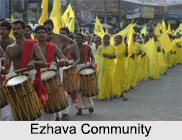 Ezhava Communities belong to a backward community and form 30 percent of the population of Kerala. They have gained a position of strength in the social and political life of Kerala too. Ezhavas form the largest group among Hindu communities in Kerala. They are also one of the major progressive communities of the state. The Ezhavas have a penchant for reform and revolution and some of the outstanding leaders of religious, cultural and social changes have sprung from them.
Ezhava Communities belong to a backward community and form 30 percent of the population of Kerala. They have gained a position of strength in the social and political life of Kerala too. Ezhavas form the largest group among Hindu communities in Kerala. They are also one of the major progressive communities of the state. The Ezhavas have a penchant for reform and revolution and some of the outstanding leaders of religious, cultural and social changes have sprung from them.
Origin of Ezhava Community
The name `Ezhava` is said to apply to those who inhabit Quilon and the southern parts of Kerala, those who live between Quilon and Cochin are known as Chovans, the Thiyyas being spread over the north of Cochin, especially in Malabar. They are considered to be descendants of Villavar the founders of ancient Dravidian Chera Dynasty who once ruled parts of southern India. Villavar were a warrior caste among the Dravidians who ruled most of India.
History of Ezhava Community
Historians believe that Ezhavas of Kerala are soldiers of Villavar tribe who founded Chera Kingdom. According to Ezhava folk songs, the Ezhavas were the progeny of four bachelors that the king of Sri Lanka sent to Kerala at the request of the Chera King Bhaskara Ravi Varma, in the 1st Century AD. These men were sent, apparently to set up Coconut farming in Kerala.
Religion of Ezhava Community
Though traditionally outcastes among the Hindus of Kerala, they enjoyed the respect and regard of royalty. Their religious practices have been influenced by Buddhism and widespread adherence to Shaivite and Tantric rituals. Though they are usually known as a community of farmers and toddy-rappers, they have also a tradition of scholarship in Sanskrit subjects.
Since their origins go back to the dim past, the customs and beliefs of the Ezhavas and Thiyyas are primitive. The old Tamil background gave them the God Subrahmania and the Goddess Kali and Buddhism introduced Chathan, Chithan and Arathan - all Sanskrit synonyms for the Lord Buddha.
Society of Ezhava Community
Ezhava community follows a matriarchal family pattern. However there are groups within this community who follow a patriarchal social set up as well. Marriage ceremonies vary from place to place for this community.
Profession of Ezhava Community
Originally their occupation was toddy-tapping but now poets, philosophers, Ayurvedic physicians and astrologers are also to be included within this community. There were also renowned Kalaripayattu experts among them. The circus holds a special attraction among community members in north Kerala and many of the famous acrobats of India come from this community.









